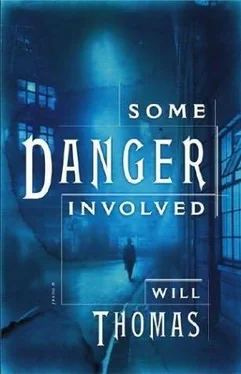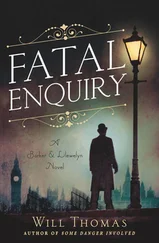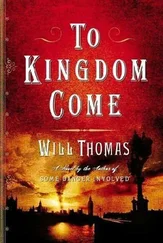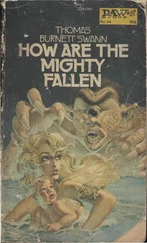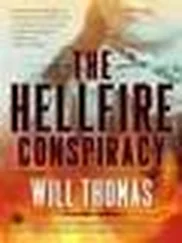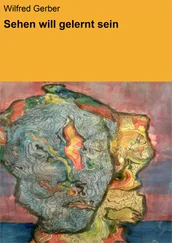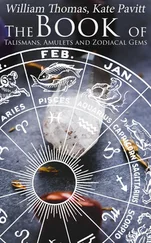Will Thomas - Some Danger Involved
Здесь есть возможность читать онлайн «Will Thomas - Some Danger Involved» весь текст электронной книги совершенно бесплатно (целиком полную версию без сокращений). В некоторых случаях можно слушать аудио, скачать через торрент в формате fb2 и присутствует краткое содержание. Жанр: Исторический детектив, на английском языке. Описание произведения, (предисловие) а так же отзывы посетителей доступны на портале библиотеки ЛибКат.
- Название:Some Danger Involved
- Автор:
- Жанр:
- Год:неизвестен
- ISBN:нет данных
- Рейтинг книги:4 / 5. Голосов: 1
-
Избранное:Добавить в избранное
- Отзывы:
-
Ваша оценка:
- 80
- 1
- 2
- 3
- 4
- 5
Some Danger Involved: краткое содержание, описание и аннотация
Предлагаем к чтению аннотацию, описание, краткое содержание или предисловие (зависит от того, что написал сам автор книги «Some Danger Involved»). Если вы не нашли необходимую информацию о книге — напишите в комментариях, мы постараемся отыскать её.
Some Danger Involved — читать онлайн бесплатно полную книгу (весь текст) целиком
Ниже представлен текст книги, разбитый по страницам. Система сохранения места последней прочитанной страницы, позволяет с удобством читать онлайн бесплатно книгу «Some Danger Involved», без необходимости каждый раз заново искать на чём Вы остановились. Поставьте закладку, и сможете в любой момент перейти на страницу, на которой закончили чтение.
Интервал:
Закладка:
"Why do you call him capitaine?" I asked, watching my employer in his shirtsleeves working in the garden.
"Because that is what he was, a ship's captain aboard the Osprey, a steamer trading along the South China Sea. I was his galley cook. He was a good captain, though not above cracking the occasional skull or two."
I leaned forward, conspiratorially, and asked, "What happened to his eyes?"
The Frenchman put a knowing finger aside his purple-veined nose. "Not my secret to tell, mon ami. Here is your omelet."
He set down a plate containing a perfect semicircle of eggs. Cheese and mushrooms spilled from the center. It was golden, fragrant, and beautiful. I took a bite.
"My word, that's incredible," I said.
"I hope you don't mind a little cigarette ash in your eggs. You didn't complain about it in the stew yesterday. More coffee? You don't know how refreshing it is to see someone in this house who enjoys my cooking. Mac won't touch anything that isn't blessed by his rabbi, and the last fellow was a damnable Chinaman who picked at my food as if I'd put a rat in it. I almost did, just to spite him."
"I hear the fellow died," I said, pressing for information.
"Oui, but not from my cooking. As your police say here, he caught the 'lead flu.' It's good to have you here, Monsieur Llewelyn. I believe I shall declare the contest at an end and return this house to proper cuisine, but only for your sake, not for mon capitaine. Unless you think I should try some haggis. I've never stuffed a sheep's stomach before."
"No haggis, please. I suppose I had better go out and see if Mr. Barker needs me. Thank you for the wonderful coffee and the omelet. Au revoir."
"Really, monsieur, whoever taught you French has a grudge against my country."
I was shaking my head at Barker's choices in help as I stepped out of doors. Chinese gardeners. Jewish butlers. Lazy clerks. Temperamental French cooks, and last but not least, downtrodden Welsh assistants. I stepped out into a regular flurry of Chinamen. Barker was easy to spot, being the only one of us over five and a half feet in height. Harm sunk his teeth into my boot in jovial greeting, and I dragged him across the white pebbles to his owner.
"Morning, sir! What are our plans for today?"
Barker put down his rake and wiped his forehead with a handkerchief. "We are attending Mr. Pokrzywa's funeral in about an hour."
"His funeral? So soon?"
"Not soon. In fact, it is late. The Jews do not embalm their dead, you see, and the body must be in the ground within twenty-four hours, if possible. They believe the body should be treated reverently and allowed to decay according to nature's timetable."
"I've never been to a Jewish funeral. Are Gentiles allowed?"
"We are, provided we observe their rituals. I'll explain everything as we go along, but you must pay close attention. Though they may be intent on the ceremony, there will be many eyes upon us. You must act with respect and sincerity. If you do, it shall cement our relationship with the community. If you fail, we might as well send a note to Sir Moses declining the case."
"I'll not fail, sir," I promised.
"Good lad. It is a beautiful service, with deep meaning behind every action, different in some ways from our own funerals. In fact, you'll hardly believe that such a service goes on in London every day."
"You say different, sir. In what ways is it different?" I asked, hoping to prepare myself.
"What?" Barker asked. "You want me to give away the surprise and miss the chance to watch you squirm? Not hardly. You'll get on. Or you won't."
While the workmen showed signs of leaving for the day, we went inside. Barker went upstairs to change, while I chose a more somber waistcoat and tie. When we stepped outside, Racket and his cab were just pulling up to the curb. The warm sun lit up Racket's red beard, which fairly glowed against his dark clothes. We clambered up into the vehicle and made our way east, skirting the Thames.
I had passed the old Jewish cemetery a time or two in the past, on the way to an interview, but I had never stopped to peer inside. Aside from the Hebrew lettering on the gravestones, the main difference between this and any Christian cemetery was the lack of memorials and mausoleums. There was little to distinguish one family from another, just rows of similar-looking markers.
Beside the cemetery there was a prayer hall, not much different from a chapel. The entire ceremony would be graveside, and not, as I had supposed, in a synagogue. At the door, a man corresponding to an usher presented us each with four items: a skullcap, a hair clip, a black ribbon, and a small pin. As if he did such things every day (and who can tell about Barker, perhaps he did), my employer turned me about and attached the skullcap to the back of my head with the hair clip. Then he pinned the ribbon to my lapel. It was strange to see him in a skullcap, but he wore it with dignity.
Inside, we sat close to the back, but the room was small enough that I had a good view of the coffin. It was an unadorned pine box of simple workmanship, and I knew the body inside it was swathed in a shroud, just as the one to whom he bore an uncanny resemblance had been swathed nineteen hundred years before.
"That's a very plain coffin," I remarked to Barker sotto voce. "I thought he'd been paying money every month to his chevra-whatever."
"They believe in simple burials. I assure you that Sir Moses, and even Lord Rothschild for all his millions, will have a similar burial."
"There are no flowers," I whispered.
"No," Barker answered. "They are not part of a Jewish funeral. There will also be no music. Now listen, lad, when I give you the nudge, I want you to seize the ribbon on your lapel, and rip it."
"You want me to what?"
Just then a rabbi got up to speak. It might have helped me had he spoken in English, but the entire ceremony was in Hebrew. To me, whenever someone speaks in another language, it always seems to drone on and on. The rabbi pontificated through his long, curling beard, and after a quarter hour or so, I was beginning to stifle a yawn. Just then Barker cracked me in the ribs, his little "nudge." I gave a loud cough and ripped my ribbon. Simultaneously, the entire assembly tore their own ribbons, and even their clothing, and gave a brief cry of grief. This, as it turned out, was the kriah, the first formal act of mourning.
"Rather large crowd," I whispered to my employer. "I thought he had no family."
"The fact that he had no family is why the crowd is so large," Barker explained patiently. "It means that the entire community becomes his family. Also, the Jews have great respect for the teachers of their children."
The rabbi motioned to the pallbearers, who shouldered their brother's remains. We followed them out to the gravesite. The coffin was let down into the ground with due gravity, and the rabbi spoke a brief eulogy. A Methodist minister would have been just warming up, only beginning to hint coyly about the perils of going to the grave and eternal damnation without the sin-cleansing blood of Jesus Christ.
At this point, the rabbi seized a shovel and, turning it around, used the back of it to push dirt onto the coffin. The sound of the clods of earth rattling atop the lid made some mourners flinch. He passed the shovel to the next person, who followed his example, then passed it on to the next, and so on. The mourners were filling up the grave themselves. Eventually, the shovel reached us. Barker used the backwards shovel to throw in some earth, and so did I. I liked it, the doing of it, I mean. It made me feel a part of it all, that I had done something.
The rabbi ended the brief service with a prayer. We mourners formed two lines, and the rabbi led the pallbearers, the dignitaries of the school, and Pokrzywa's closest friends between us. Among them was Reb Shlomo, who patted my hand as he passed.
Читать дальшеИнтервал:
Закладка:
Похожие книги на «Some Danger Involved»
Представляем Вашему вниманию похожие книги на «Some Danger Involved» списком для выбора. Мы отобрали схожую по названию и смыслу литературу в надежде предоставить читателям больше вариантов отыскать новые, интересные, ещё непрочитанные произведения.
Обсуждение, отзывы о книге «Some Danger Involved» и просто собственные мнения читателей. Оставьте ваши комментарии, напишите, что Вы думаете о произведении, его смысле или главных героях. Укажите что конкретно понравилось, а что нет, и почему Вы так считаете.
